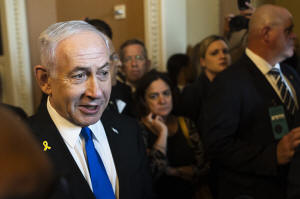Another key ally quits Netanyahu's governing coalition in a major blow
to Israel's leader
[July 17, 2025]
By TIA GOLDENBERG
TEL AVIV, Israel (AP) — Israeli Prime Minister Benjamin Netanyahu
suffered a major political blow on Wednesday as a key governing partner
announced it was quitting his coalition government, leaving him with a
minority in parliament as the country faces a litany of challenges.
Shas, an ultra-Orthodox party that has long served as kingmaker in
Israeli politics, announced that it would bolt the government over
disagreements surrounding a proposed law that would enshrine broad
military draft exemptions for its constituents — the second
ultra-Orthodox governing party to do so this week.
“In this current situation, it’s impossible to sit in the government and
to be a partner in it,” Shas Cabinet minister Michael Malkieli said in
announcing the party's decision.
But Shas said it would not undermine Netanyahu's coalition from the
outside and could vote with it on some legislation, granting Netanyahu a
lifeline in what would otherwise make governing almost impossible and
put his lengthy rule at risk.
Once their resignations come into effect, Netanyahu's coalition will
have 50 seats in the 120-seat parliament.
Netanyahu's government doesn't face immediate collapse
Netanyahu's rule, for now, doesn't appear threatened. Once Shas'
resignations are put forward, there's a 48-hour window before they
become official, which gives him a chance to salvage his government.
Netanyahu’s Likud party did not immediately comment on Shas’ departure.
The party's announcement also comes just before lawmakers recess for the
summer, granting Netanyahu several months of little to no legislative
activity to bring the parties back into the fold with a possible
compromise on the draft law.

But if the coalition isn't shored up by the time the Knesset reconvenes
in the fall, it could signal that Israel may be headed to early
elections, which are currently scheduled for October 2026.
The political instability comes at a pivotal time for Israel, which is
negotiating with Hamas on the terms for a U.S.-backed ceasefire proposal
for Gaza. Shas' decision isn't expected to derail the talks.
But with a fracturing coalition, Netanyahu will feel more pressure to
appease his other governing allies, especially the influential far-right
flank, which opposes ending the 21-month war in Gaza so long as Hamas
remains intact. They have threatened to quit the government if it does
end.
[to top of second column]
|

Israeli Prime Minister Benjamin Netanyahu, speaks to reporters
before a meeting with lawmakers at the Capitol in Washington,
Wednesday, July 9, 2025. (AP Photo/Manuel Balce Ceneta)

Despite losing two important political partners, Netanyahu will still be
able to move ahead on a ceasefire deal, once one is reached. The Trump
administration has been pushing Israel to wrap up the war.
The embattled Netanyahu is on trial for alleged corruption, and critics
say he wants to hang on to power so that he can use his office as a
bully pulpit to rally supporters and lash out against prosecutors and
judges. That makes him all the more vulnerable to the whims of coalition
allies.
Exemptions for the ultra-Orthodox have long divided Israel
On Tuesday, the ultra-Orthodox United Torah Judaism party said it was
quitting over Netanyahu's failure to pass a law on the military draft
exemptions.
Military service is compulsory for most Jewish Israelis, and the issue
of exemptions has long divided the country. Those rifts have widened
since the start of the war in Gaza as demand for military manpower has
grown and hundreds of soldiers have been killed.
A decades-old arrangement by Israel’s first prime minister granted
hundreds of ultra-Orthodox men exemptions from compulsory Israeli
service. Over the years, those exemptions ballooned into the thousands.
The ultra-Orthodox say their men are serving the country by studying
sacred Jewish texts and preserving centuries’ old tradition. They fear
that mandatory enlistment will dilute adherents’ connection to the
faith.
But most Jewish Israelis see the exemption as unfair, as well as the
generous government stipends granted to many ultra-Orthodox men who
study instead of work throughout adulthood.
Netanyahu’s coalition has been trying to find a path forward on a new
law. But his base is largely opposed to granting sweeping draft
exemptions and a key lawmaker has stood in the way of giving the
ultra-Orthodox a law they can get behind, prompting their exit.
All contents © copyright 2025 Associated Press. All rights reserved
 |